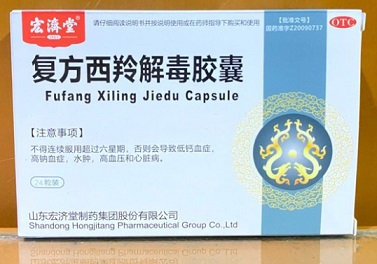Traditional Chinese medicine formulation called Fufang Yinhua Jiedu granules shows promise in COVID-19 treatment
Nikhil Prasad Fact checked by:Thailand Medical News Team Sep 19, 2024 1 year, 4 months, 3 weeks, 6 days, 1 hour, 57 minutes ago
TCM News: In the relentless battle against COVID-19, researchers are exploring a range of treatments. One potential solution, Fufang Yinhua Jiedu (FFYH) granules (Also known as Fufang Xiling Jiedu and available in capsule formats), has recently caught the attention of the scientific community. FFYH granules, rooted in Traditional Chinese Medicine (TCM), have shown promising results in treating mild COVID-19 cases. This
TCM News report delves into a recent study that evaluated the clinical efficacy of FFYH and its anti-viral mechanisms, highlighting its potential to become an alternative treatment in managing the pandemic.
 Traditional Chinese medicine formulation called Fufang Yinhua Jiedu
Traditional Chinese medicine formulation called Fufang Yinhua Jiedu
granules shows promise in COVID-19 treatment
Study Overview
A team of researchers from institutions like Yangzhou University Medical College, Yixing People’s Hospital, and the National Center of Technology Innovation for Animal Model-China have been studying FFYH’s effects. Their investigation involved both laboratory experiments and a clinical trial to determine FFYH’s effectiveness in combating COVID-19. The study included 200 mild COVID-19 patients, with half receiving FFYH and the other half being treated with Lianhua Qingwen (LHQW), another TCM widely used in China.
The researchers aimed to identify the granules' ability to block severe acute respiratory syndrome coronavirus 2 (SARS-CoV-2) replication. They also sought to understand the mechanism behind its anti-viral effects. FFYH was tested for its ability to disrupt the SARS-CoV-2 life cycle and its impact on autophagy, a process where the body’s cells break down and recycle their components.
Key Findings: Inhibiting SARS-CoV-2 Replication
The study’s results were quite promising. FFYH granules demonstrated a significant ability to inhibit SARS-CoV-2 replication. Laboratory findings showed that FFYH could reduce the virus's RNA and protein levels. The granules primarily targeted the virus during its binding and replication phases, blocking these essential stages of its life cycle.
The study also highlighted FFYH’s role in autophagy, a process exploited by viruses like SARS-CoV-2 to replicate within host cells. By inhibiting this process, FFYH was able to prevent the virus from multiplying. Researchers pinpointed the AKT/mTOR signaling pathway as a key area where FFYH exerted its influence. Blocking this pathway helped stop the virus from using autophagy to its advantage.
Clinical Trial Results
The clinical trial component of the study provided real-world evidence of FFYH’s potential benefits. Patients treated with FFYH showed faster recovery times compared to those given LHQW. On average, patients in the FFYH group experienced quicker resolution of symptoms, including respiratory issues and fatigue.
One of the most noteworthy aspects of the study was FFYH’s effe
ct on cytokine storms, a severe immune reaction observed in some COVID-19 patients. Cytokine storms occur when the body produces too many inflammatory molecules in response to infection, leading to severe complications, including acute respiratory distress syndrome (ARDS). FFYH effectively reduced the production of cytokines like IL-6 and IL-1β, which are known to contribute to these dangerous immune responses.
The study also highlighted FFYH’s impact on hematological parameters, which are crucial in determining the severity of COVID-19. Patients treated with FFYH experienced improvements in platelet count, neutrophil levels, and lymphocyte ratios. These findings suggest that FFYH not only helps fight the virus but also aids in restoring balance to the body’s immune response.
FFYH’s Superiority in Certain Subgroups
Subgroup analyses revealed that FFYH was particularly effective in male patients and those with abnormal hematology parameters. These patients experienced faster recovery times and more significant improvements in clinical symptoms compared to those in the LHQW group. Interestingly, the study found that patients aged 32 - 42 responded better to FFYH than LHQW, a finding that may guide future treatment recommendations.
In male patients, FFYH shortened the recovery time for both respiratory and clinical symptoms. This is particularly relevant, as men have been shown to suffer more severe outcomes from COVID-19 compared to women. FFYH’s impact on hematological abnormalities was also more pronounced, helping to restore normal blood parameters quicker than LHQW.
Mechanisms of Action: Blocking Cytokine Storms
The anti-inflammatory properties of FFYH played a crucial role in its effectiveness. FFYH significantly reduced the production of pro-inflammatory cytokines, which are responsible for the dangerous immune overreaction in some COVID-19 patients. The study found that FFYH reduced levels of GM-CSF, IL-7, and IFN-α, all of which are associated with severe COVID-19 cases. FFYH also improved the levels of IL-12, IL-1β, and IL-17A, balancing the immune response to promote healing without exacerbating inflammation.
Blocking the AKT/mTOR signaling pathway, FFYH also inhibited autophagy, which the virus uses to replicate. By stopping this process, FFYH may prevent the virus from spreading within the body, reducing the severity of the disease and aiding recovery.
Conclusion: A Promising Future for FFYH
The study results provide compelling evidence that FFYH granules are a promising treatment for mild COVID-19. Their ability to inhibit viral replication, control cytokine storms, and improve hematological parameters positions FFYH as a potential alternative or complementary treatment for COVID-19. With faster recovery times and improved outcomes in specific patient subgroups, FFYH could be particularly beneficial for male patients and those with abnormal immune responses.
While further research is needed to confirm these findings in more extensive and diverse populations, the current results are encouraging. FFYH’s dual ability to fight the virus and modulate the body’s immune response could make it a valuable tool in managing future COVID-19 cases, especially as variants continue to emerge.
The study findings were published in the peer-reviewed journal: Frontiers in Pharmacology.
https://www.frontiersin.org/journals/pharmacology/articles/10.3389/fphar.2024.1431617/full
For the latest
TCM News, keep on logging to Thailand Medical News.
Read Also:
https://www.thailandmedical.news/news/study-finds-that-traditional-chinese-medicine-lianhua-qingwen-enhances-immunity-against-omicron-variants
https://www.thailandmedical.news/news/traditional-chinese-medicine-herbal-remedies-offer-hope-in-combating-covid-19-cytokine-storms
